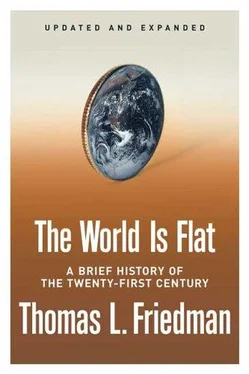While interviewing Promod Haque at Norwest Venture Partners in Palo Alto, I was helped by the firm's public relations director, Katie Belding, who later sent me this e-mail: “I was chatting with my husband about your meeting with Promod the other day... He is a history teacher at a high school in San Mateo. I asked him, 'Where were you when the world went flat?' He said it just happened the other day at school when he was in a faculty meeting. A student was suspended for helping another student cheat on a test-we're not talking the traditional writing answers on the bottom of your shoe or passing a note, though...” Intrigued, I called her husband, Brian, and he picked up the story: “At the end of the period, when all of the tests were being passed up to the front of the classroom, this student very quickly and slyly pulled out his cell phone and somehow snapped a picture of some test questions, and instantly e-mailed it to his friend who was taking the same test the next period. His friend also had a cell phone with a digital camera and e-mail capabilities and was apparently able to view the questions before the next period. The student was caught by another teacher when he pulled out the cell phone between periods. It is against the rules to have a cell phone on campus-even though we know that all the kids do-so the teacher confiscated it and saw that the kid had a test on it. So the dean of discipline, at our regular faculty meeting, opened by saying, 'We have something new to worry about.' Essentially he said, 'Beware, keep your eyes open, because the kids are so far ahead of us in terms of the technology.'”
But things aren't all bad with this new technology, noted Brian: “I went to a Jimmy Buffett concert earlier this year. Cameras were not allowed, but cell phones were. So then the concert starts and everyone suddenly starts holding up their cell phones and taking pictures of Jimmy Buffett. I've got one right on my wall. We were sitting in the second row and the guy next to us held up his cell phone, and I said, 'Hey, would you mind e-mailing me some of those? No one will believe we sat this close.' He said 'Sure,' and we gave him a card with our e-mail [address]. We didn't really expect to see any, but the next day he e-mailed us a bunch.”
My trip to Beijing described earlier fell right after the fifteenth anniversary of the Tiananmen Square massacre, which happened on June 4, 1989, that is, 6/4/89. My colleagues at the Times bureau informed me that on that day the Chinese government censors were blocking SMS messages on cell phones that contained any reference to Tiananmen Square or even the numbers 6 and 4. So if you happened to be dialing the phone number 664-6464, or sending a message in which you told someone you would meet at 6 p.m. on the 4th floor, the Chinese censors blocked it using their jamming technology.
Mark Steyn, writing in the National Review (October 25, 2004), related a story from the London Arabic newspaper paper Al-Quds al-Arabi about a panic that broke out in Khartoum, Sudan, after a crazy rumor swept the city, claiming that if an infidel shook a man's hand, that man could lose his manhood. “What struck me about the story,” wrote Steyn, “was a detail: The hysteria was spread by cell phones and text messaging. Think about that: You can own a cell phone yet still believe a foreigner's handshake can melt away your penis. What happens when that kind of technologically advanced primitivism advances beyond text messaging?”
This is not a chapter about cell phones, so why do I raise these stories? Because ever since I began writing about globalization, I've been challenged by critics along one particular line: “Isn't there a certain technological determinism to your argument? To listen to you, Friedman, there are these ten flatteners, they are converging and flattening the earth, and there is nothing that people can do but bow to them and join the parade. And after a transition, everyone will get richer and smarter and it will all be fine. But you're wrong, because the history of the world suggests that ideological alternatives, and power alternatives, have always arisen to any system, and globalization will be no different.”
This is a legitimate question, so let me try to answer it directly: I am a technological determinist! Guilty as charged.
I believe that capabilities create intentions. If we create an Internet where people can open an online store and have global suppliers, global customers, and global competitors, they will open that online store or bank or bookshop. If we create work flow platforms that allow companies to disaggregate any job and source it to the knowledge center anywhere in the world that can perform that task most efficiently at the lowest cost, companies will do that sort of outsourcing. If we create cell phones with cameras in them, people will use them for all sorts of tasks, from cheating on tests to calling Grandma in her nursing home on her ninetieth birthday from the top of a mountain in New Zealand. The history of economic development teaches this over and over: If you can do it, you must do it, otherwise your competitors will-and as this book has tried to demonstrate, there is a whole new universe of things that companies, countries, and individuals can and must do to thrive in a flat world.
But while I am a technological determinist, I am not a historical determinist. There is absolutely no guarantee that everyone will use these new technologies, or the triple convergence, for the benefit of themselves, their countries, or humanity. These are just technologies. Using them does not make you modern, smart, moral, wise, fair, or decent. It just makes you able to communicate, compete, and collaborate farther and faster. In the absence of a world-destabilizing war, every one of these technologies will become cheaper, lighter, smaller and more personal, mobile, digital, and virtual. Therefore, more and more people will find more and more ways to use them. We can only hope that more people in more places will use them to create, collaborate, and grow their living standards, not the opposite. But it doesn't have to happen. To put it another way, I don't know how the flattening of the world will come out.
Indeed, this is the point in the book where I have to make a confession: I know that the world is not flat.
Yes, you read me right: I know that the world is not flat. Don't worry. I know.
I am certain, though, that the world has been shrinking and flattening for some time now, and that process has quickened dramatically in recent years. Half the world today is directly or indirectly participating in the flattening process or feeling its effects. I have engaged in literary license in titling this book The World Is Flat to draw attention to this flattening and its quickening pace because I think it is the single most important trend in the world today.
But I am equally certain that it is not historically inevitable that the rest of the world will become flat or that the already flat parts of the world won't get unflattened by war, economic disruption, or politics. There are hundreds of millions of people on this planet who have been left behind by the flattening process or feel overwhelmed by it, and some of them have enough access to the flattening tools to use them against the system, not on its behalf. How the flattening could go wrong is the subject of this chapter, and I approach it by trying to answer the following questions: What are the biggest constituencies, forces, or problems impeding this flattening process, and how might we collaborate better to overcome them?
Too Sick
I once heard Jerry Yang, the cofounder of Yahoo!, quote a senior Chinese government official as saying, “Where people have hope, you have a middle class.” I think this is a very useful insight. The existence of large, stable middle classes around the world is crucial to geopolitical stability, but middle class is a state of mind, not a state of income. That's why a majority of Americans always describe themselves as “middle class,” even though by income statistics some of them wouldn't be considered as such. “Middle class” is another way of describing people who believe that they have a pathway out of poverty or lower-income status toward a higher standard of living and a better future for their kids. You can be in the middle class in your head whether you make $2 a day or $200, if you believe in social mobility-that your kids have a chance to live better than you do-and that hard work and playing by the rules of your society will get you where you want to go.
Читать дальше












